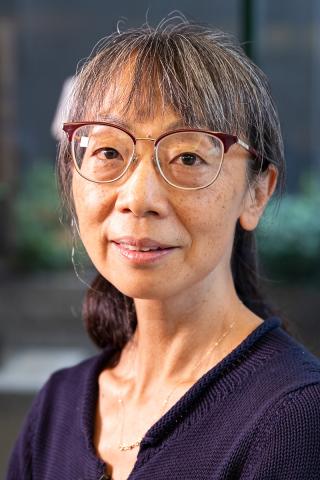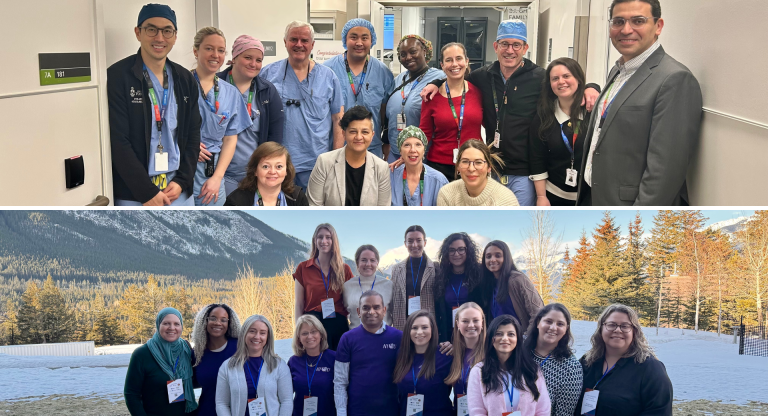Six LTRI researchers named new and renewed Canada Research Chairs

As part of the Government of Canada’s sustained investment in research excellence through the Canada Research Chairs (CRC) program, six scientists at Sinai Health’s Lunenfeld-Tanenbaum Research Institute (LTRI) have been awarded new or renewed Chairs.
The awards include two new Chairs for early-career investigators, Drs. Diane Haakonsen and Katherine Stewart, who recently started their laboratories at LTRI. The four renewed Chairs recognizing sustained excellence were awarded to Drs. Kieran Campbell, Rayjean Hung, Hartland Jackson, and Mei Zhen. This brings the number of active CRCs at Sinai Health to 16.
Established in 2000 to attract and retain top research talent, the prestigious national program supports internationally recognized leaders (Tier 1) and exceptional emerging scientists (Tier 2) whose work is transforming health and science across Canada. Their research at LTRI spans the cellular, molecular, and environmental underpinnings of health and disease, with particular strengths in cancer, cardiometabolic disease, and neurodegeneration.
“I congratulate all our investigators on their well-deserved CRC appointments,” said Dr. Gingras, LTRI Director and Vice President of Research for Sinai Health, who is also a Canada Research Chair in Functional Proteomics. “This prestigious honour is a testament to their individual excellence as researchers and to the important work they do to advance knowledge with the aim of improving health through better diagnostics and treatment for patients around the world.”
Learn more about the CRC-awarded research:
Dr. Kieran Campbell, Tier 2 Canada Research Chair in Machine Learning in Translational Biomedicine

Dr. Campbell is an investigator at LTRI and an assistant professor of molecular genetics and statistical sciences at U of T. He develops advanced computational tools to better understand and treat cancer.
His research focuses on the tumour microenvironment which encompasses the diverse community of cells that surround and influence tumours. By combining single-cell and spatial sequencing technologies—which allows for the analysis of gene expression in the individual cells within a tissue—with machine learning, Dr. Campbell is investigating how the tumour microenvironment impacts cancer growth. This reveals how the interactions between the tumour an its surrounding differ across various cancer types and between sexes, paving the way for new drug targets and more personalized immunotherapies.
Dr. Diane Haakonsen, Tier 2 Research Chair in Cellular Stress Signalling

Dr. Haakonsen is an investigator at LTRI and an assistant professor of molecular genetics at U of T. Her research investigates how cells regulate stress responses after exposure to harmful situations such as toxins, pathogens or nutrient shortages.
One of her major discoveries before joining LTRI was that cells must actively expend energy to terminate stress responses, underscoring that prolonged activation of the stress response may be more harmful than the original stress. She is now investigating how stress response pathways are regulated in health and diseases such as cancer and neurodegeneration, with the aim to identify new therapeutic strategies that modulate the duration and resolution of stress signaling.
Dr. Rayjean Hung, Tier 1 Canada Research Chair in Integrative Molecular Epidemiology

Dr. Hung is a senior investigator, the associate director of population health and the head of the Prosserman Centre for Population Health Research at LTRI. She is also a professor of epidemiology at U of T. In her research, Dr. Hung harnesses the power of big data from large-scale population studies to uncover how molecular profiles, environmental and health factors influence disease risk and health outcomes across diverse populations. By integrating population-level health data with molecular insights from genomics, epigenomics, proteomics and imaging, her research identifies patterns that can refine early detection and prevention strategies. Beyond cancer research, Dr. Hung co-leads the Ontario Birth Study (OBS) and the Healthy Life Trajectories Initiative (HeLTI)-South Africa project, large-scale longitudinal studies investigating how factors from pregnancy through early childhood shape long-term health and development.
Dr. Hartland Jackson, Tier 2 Canada Research Chair in Systems Pathology

Dr. Jackson is an investigator at LTRI, an associate scientist at the Ontario Institute for Cancer Research and an assistant professor of molecular genetics at U of T. His work uses imaging mass cytometry, an approach that enables the identification of individual cell states in a tissue, and its combination with other high-dimensional technologies to study tumours as complex, interconnected systems of cells. His team maps how individual cells interact, function and organize within tissues. These approaches have helped identify biomarkers linked to clinical outcomes and enabled the screening of distinct cell clones in disease models. Focused on the multi-cellular tumour microenvironments that drive cancer progression and therapy resistance, particularly in pancreatic, breast and other epithelial cancers, Dr. Jackson’s research aims to uncover new therapeutic targets and improve outcomes for patients.
Dr. Katherine Stewart, Tier 2 Canada Research Chair in Stem Cell Biology

Dr. Katherine Stewart is an investigator at LTRI and an assistant professor of molecular genetics at U of T. She explores how dying cells influence tissue health. She previously made an unexpected discovery that stem cells, unique cells that can multiply and turn into specialized organ cells, engulf dying cells in the tissue. In her newly minted LTRI lab, she is now investigating how and why stem cells in the skin and breast detect, respond to, and clear dying cells, both in healthy tissues and in cancer. By integrating stem cell biology, immunology and disease research, Dr. Stewart aims to uncover how this clearance process affects regeneration, inflammation and tumour progression. Her insights could transform the understanding of how tissues maintain health and how their breakdown contributes to disease.
Dr. Mei Zhen, Tier 1 Canada Research Chair in Brain and Behaviour

Dr. Zhen is a senior investigator at LTRI, a professor of molecular genetics at U of T. Her research focuses on the molecular and circuit-level mechanisms that enable brain cells to function and how their disruption leads to neurological disease. Her team has identified key molecules and mechanisms essential for nervous system development and function, which have revealed the cause and treatment for a rare neurological disorder, CLIFADD. Her work has also revealed shared motor circuit designs across species and led to the concept of “circuit compression,” which explains how simple nervous systems perform complex behaviours. Furthermore, Dr. Zhen led the creation of the first map of nervous system development that occurs over time for any animal.
These new and renewed appointments underscore Sinai Health’s commitment to supporting discovery-driven research that advances human health in Canada and around the world.
Read the official Government of Canada announcement and learn more about the Canada Research Chairs program: https://www.chairs-chaires.gc.ca/home-accueil-eng.aspx












